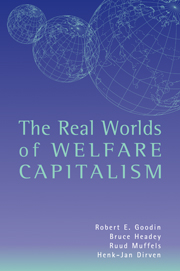Book contents
- Frontmatter
- Contents
- Preface
- Acknowledgments
- 1 Introduction
- Part I Setting the scene
- Part II One standard of success: external moral criteria
- 7 Promoting effciency
- 8 Reducing poverty
- 9 Promoting equality
- 10 Promoting integration
- 11 Promoting stability
- 12 Promoting autonomy
- Part III Another standard of success: internal institutional criteria
- Appendix tables
- References
- Index
8 - Reducing poverty
Published online by Cambridge University Press: 22 September 2009
- Frontmatter
- Contents
- Preface
- Acknowledgments
- 1 Introduction
- Part I Setting the scene
- Part II One standard of success: external moral criteria
- 7 Promoting effciency
- 8 Reducing poverty
- 9 Promoting equality
- 10 Promoting integration
- 11 Promoting stability
- 12 Promoting autonomy
- Part III Another standard of success: internal institutional criteria
- Appendix tables
- References
- Index
Summary
What poverty ‘really means’ is a vexed question. As it is actually experienced by those who are poor, poverty may well be more a matter of social conventions than objective conditions. Poverty is arguably relative rather than absolute, socially determined rather than reflecting fixed natural necessities, requisites of sociability rather than material necessities. Were we constructing indicators de novo we might wish to take all those considerations on board. The data available to us in the panel studies, however, have little bearing on more subjective aspects of the social experience of poverty.
What the panel surveys provide in abundance is information about people's command over cash resources. By anyone's reckoning, that is largely what poverty is all about. The analysis of panel data provides insights into poverty, its duration and recurrence, which are unavailable in any other way.
Measurement issues
In assessing the adequacy of a family's income, among the first things we must do is to take into account how many mouths must be fed. Hence we must adjust for household size, which is conventionally done through ‘equivalence scales’ of the sort discussed in section 6.3.2 above.
The next step in addressing the adequacy of people's incomes is to specify what level of income, thus adjusted, constitutes poverty. Relying upon ‘official’ poverty lines would be impossible. Even if every country in the world recognized an official poverty line, different countries applying different poverty lines would confound any genuinely comparative research.
- Type
- Chapter
- Information
- The Real Worlds of Welfare Capitalism , pp. 152 - 172Publisher: Cambridge University PressPrint publication year: 1999



